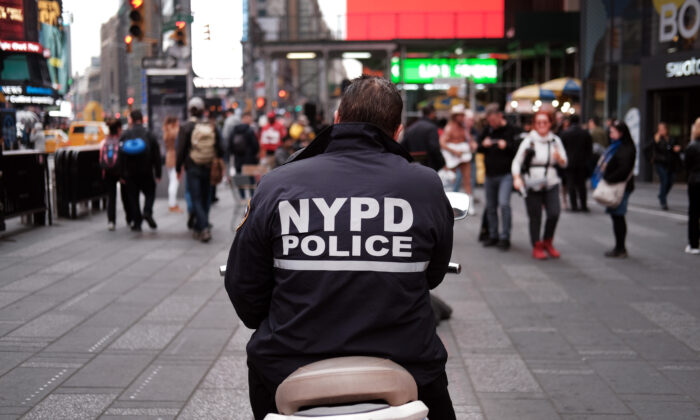NEW YORK—The arrest of an NYPD officer for allegedly spying on local Tibetans for Beijing should serve as a “wake-up call” for U.S. officials about the depth of Chinese espionage in the country, local Tibetan activists said.
Baimadajie Angwang, an ethnic Tibetan and naturalized U.S. citizen, had worked at the NYPD’s 111th Precinct in Queens, and is also an Army reservist holding a “secret” security clearance. The 33-year-old was arrested on Sept. 19 on four charges, including acting as an illegal Chinese agent, and faces up to 55 years prison if convicted.
Angwang’s arrest was hardly a surprise to the ethnic Tibetans in New York City who had prior contact with him.
The Tibetan Community of New York and New Jersey (TCNYNJ), a New York-based nonprofit established in 1979, said they first met Angwang in 2019 when he offered to invite other NYPD officers to the organization’s Lunar New Year celebration event. Not long after that, Angwang’s behavior started raising red flags.
The group, at a Sept. 22 press conference held in Queens, said Angwang’s name “doesn’t sound like a Tibetan name,” so the officer had initially approached them using a different name that was more Tibetan sounding.
While “virtually unknown” in the local Tibetan community until 2018, Angwang had since reached out to the group on “numerous occasions” to “offer service and support,” they said in a press release.
Federal prosecutors allege that Angwang, who is currently awaiting trial without bail, was secretly feeding intelligence to the Chinese Consulate in New York and helped consulate staff gain access to senior NYPD officials. According to court documents, Angwang’s chief handler was a Chinese consular official who worked under the United Front Work Department, a sprawling agency tasked with extending the regime’s influence globally.
In February 2019, Angwang appeared with his wife and child at the New Year celebration attended by thousands and was received as a “mid-level guest” because of his affiliation with the NYPD. Not long after, TCNYNJ members spotted his wife in a photo at another Lunar New Year event held at the Chinese consulate in New York, which made them “very uncomfortable,” the press release stated. Tashi Choephel, the organization’s former general secretary, told The Epoch Times that Angwang’s wife had worn the same ethnic gown to both events that took place on the same day.
 NYPD officer Baimadajie Angwang in a file photo. (The Epoch Times)
NYPD officer Baimadajie Angwang in a file photo. (The Epoch Times)Tibetans, like other ethnic minorities or religious groups such as Uyghurs and Falun Gong adherents, suffer from severe repression in China. New York City is home to thousands of Tibetan-in-exiles who escaped after experiencing various forms of persecution in China. Angwang’s connection with Chinese officials, therefore, immediately triggered alarm bells, said Choephel.
Their suspicion grew further when Angwang discouraged them from engaging in pro-Tibet activities and also expressed disapproval of speeches criticizing Beijing’s treatment of Tibetans in China.
Angwang also tried to dissuade Choephel from displaying Tibetan flags at the group’s premises in Woodside, Queens, Choephel recalled. By having the flags there, “you can’t get more donations from Flushing businessmen, it’s against China government’s agenda,” Angwang told him.
While the TCNYNJ never expected any financial support from these groups, such remarks had deeply upset Choephel. He said Angwang was trying to manipulate them to toe the Party line by exploiting their need for funding.
“What kind of Tibetan would ever tell us not to raise the Tibetan flag?” the group said in the statement, adding that they “never heeded his unsolicited advice.”
TCNYNJ discussed these observations and ultimately decided to cut ties with him, agreeing that “he did not seem like someone we could trust.”
After this, Angwang made repeated phone calls to then-president Sonam Gyephel who ignored the calls, Gyephel recounted at the press conference. But he eventually decided to confront Angwang about his connections with the Chinese regime.
“What’s your relation with the Chinese Consulate?” Gyephel asked Angwang over the phone. Gyephel also asked about the consulate photo, to which Angwang admitted that he attended the event but was helping someone with a visa application. He said, “I’m in relation with the Chinese Consulate,” according to Gyephel.
“Once I got that message, I was really shocked,” Gyephel said in a later interview with The Epoch Times. He then told Angwang that the organization no longer wanted anything to do with him. Gyephel avoided all communications with Angwang since then.
Angwang’s arrest last week has renewed focus on the Chinese regime’s ongoing spying and intimidation campaigns against dissident groups in the United States.
When Tibetan immigrants attend protests against the Chinese regime, a person like Angwang could report their names to the Chinese consulate, which in turn could punish them by targeting their relatives in China, Gyephel said.
In a Sept. 23 speech addressing Chinese espionage threats, Secretary of State Mike Pompeo described the New York Chinese consulate as “incredibly politically active.”
“They’re engaged in activities where they’re crossing the line from normal diplomacy to the kinds of things that would be more akin to what spies are doing,” Pompeo told New York Post on Wednesday when asked to elaborate on the consulate’s activities.
The administration in July closed down the Chinese consulate in Houston saying it was a “hub of spying and intellectual property theft.”
Yijun Lin contributed to this report.
Focus News: NYPD Spying Case a ‘Wake-Up Call’ About Chinese Infiltration in US, Local Tibetans Say
DOJ: More Than 300 Charged With Crimes Committed Near or at Protests Since May
